
Susan Clark is a Canadian actress and producer. She made her big screen debut in the 1967 drama film Banning and the following year played the female lead in the crime thriller Coogan's Bluff. She later starred in films Tell Them Willie Boy Is Here (1969), Colossus: The Forbin Project (1971), Valdez Is Coming (1971), Skin Game (1971), Showdown (1973), The Midnight Man (1974), Airport 1975 (1975), Night Moves (1975), The Apple Dumpling Gang (1975), Murder by Decree (1979), Promises in the Dark (1979) and Porky's (1981).
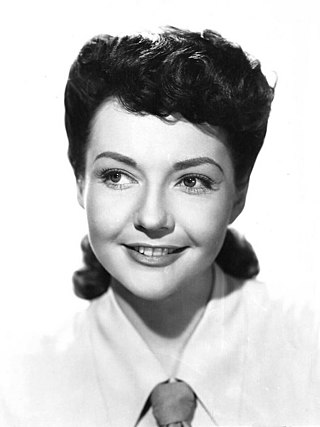
Lynn Bari was a film actress who specialized in playing sultry, statuesque man-killers in roughly 150 films for 20th Century Fox, from the early 1930s through the 1940s.
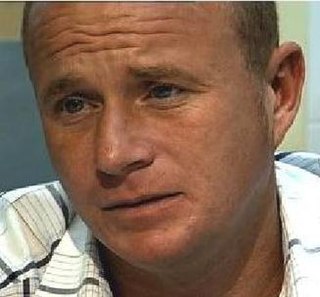
Ashley Sibelius Peacock is a fictional character from the British ITV soap opera Coronation Street. Portrayed by Steven Arnold, the character first appeared on screen during the episode airing on 1 February 1995. Ashley was a victim of the tram crash and died as part of the show's 50th-anniversary episode in December 2010.

The Star Packer is a 1934 Western film directed by Robert N. Bradbury and starring John Wayne, George "Gabby" Hayes, Yakima Canutt, and Verna Hillie.

Marjorie Morningstar is a 1958 American romantic drama film directed by Irving Rapper from a screenplay by Everett Freeman, based on the 1955 novel of the same name by Herman Wouk. The film tells a fictional coming-of-age story about a young Jewish girl named Marjorie Morgenstern in New York City in the 1950s, chronicling her attempts to become an artist—exemplified through her relationship with the actor and playwright Noel Airman. The film stars Gene Kelly and Natalie Wood, with Claire Trevor, Ed Wynn, Everett Sloane, Martin Milner, and Carolyn Jones.

Step Up 2: The Streets is a 2008 American dance drama film directed by Jon M. Chu and written by Toni Ann Johnson and Karen Barna. It serves as a sequel to 2006's Step Up and the second installment in the Step Up film series. The film stars Briana Evigan, Robert Hoffman, Will Kemp, and Cassie Ventura.

Honky Tonk is a 1941 black-and-white Western film directed by Jack Conway, produced by Pandro S. Berman, and starring Clark Gable and Lana Turner. The supporting cast features Claire Trevor, Frank Morgan, Marjorie Main, Albert Dekker and Chill Wills.

Verna Dolores Hillie was an American film actress. First recruited into movie acting by a contest, she went on to star in films for Paramount Pictures and other studios through the 1930s, before retiring from acting in the early 1940s.
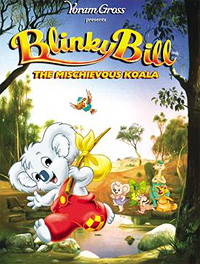
Blinky Bill: The Mischievous Koala is a 1992 Australian animated adventure comedy film directed by Yoram Gross and produced by his Sydney-based production company Yoram Gross Film Studios.
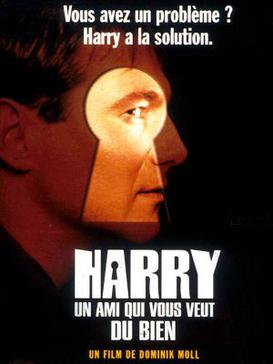
Harry, He's Here to Help is a French film released in 2000. It was directed by Dominik Moll.

Sea Change is a 2006 crime novel by Robert B. Parker, the fifth in his Jesse Stone series.
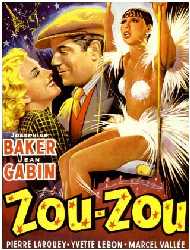
Zouzou is a French film by Marc Allégret released in 1934. Josephine Baker, who plays the title character, was the first black woman to play the leading role in a major motion picture.

Junior Miss is a 1945 American comedy film starring Peggy Ann Garner as a teenager who meddles in people's love lives.

Dude Cowboy is a 1941 American western film. David Howard directed the film and Morton Grant wrote the screenplay. The film stars Tim Holt as Terry McVey, Eddie Kane as Gordon West, Marjorie Reynolds as Barbara Adams, Byron Foulger as Frank Adams, Louise Currie as Gail Sargent, Eddie Dew as French, Helen Holmes as Aunt Althea Carter, Lloyd Ingraham as Pop Stebbins, Eddie Kane as Gordon West, and Tom London as the Silver City Sheriff.
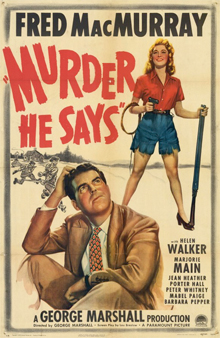
Murder, He Says is a 1945 American black comedy film directed by George Marshall and starring Fred MacMurray about a murderous rural family and the hapless pollster who becomes entangled in their hunt for a cache of money.
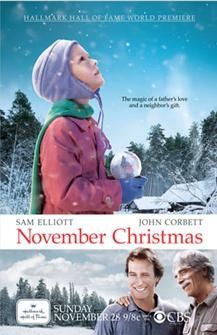
November Christmas is a 2010 American made-for-television Christmas drama film based on a short story written by Greg Coppa. The film depicts a young couple struggling with the illness of their daughter, and the effect their family had on the small, rural community they have become a part of. The film was shot in Nova Scotia. It was presented through Hallmark Hall of Fame, and premiered on CBS on November 28, 2010.

Guilty Hands is a 1931 American pre-Code crime film starring Lionel Barrymore, Kay Francis and Madge Evans and directed by W. S. Van Dyke, with uncredited assistance from Barrymore. The story concerns an attorney who murders a man who wants to marry his daughter.

Panama Flo is a 1932 American pre-Code drama film directed by Ralph Murphy and written by Garrett Fort. The film stars Helen Twelvetrees, Robert Armstrong, Charles Bickford, Marjorie Peterson and Maude Eburne. The film was released on January 19, 1932, by RKO Pictures.

Girls of the Big House is a 1945 American drama film directed by George Archainbaud and starring Lynne Roberts, Virginia Christine and Marion Martin.
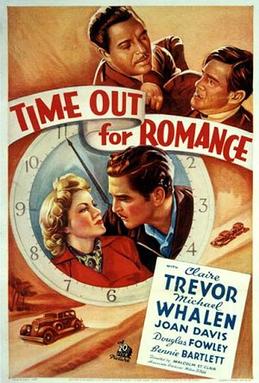
Time Out for Romance is a 1937 American romantic comedy film directed by Malcolm St. Clair, written by Lou Breslow and John Patrick, and starring Claire Trevor, Michael Whalen, Joan Davis, Chick Chandler, Douglas Fowley and Benny Bartlett. It was released on February 10, 1937, by 20th Century Fox.




















